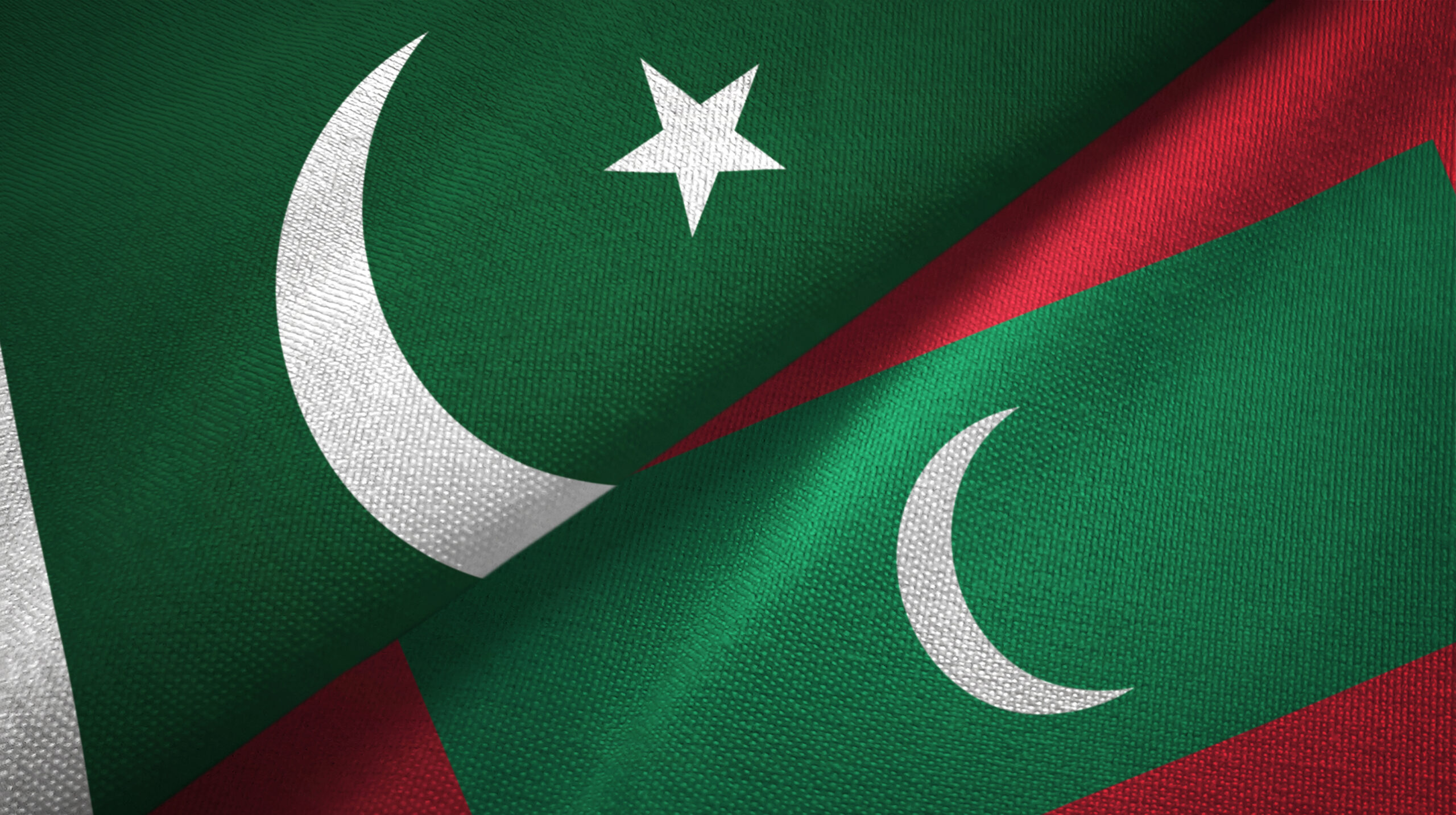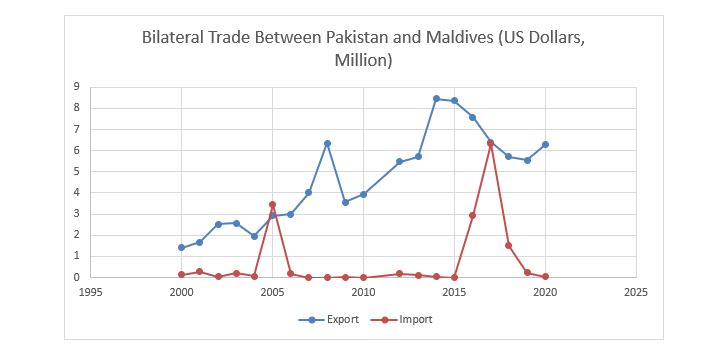
Pakistan and Maldives have shared a friendly relationship, supported by common principles within the Islamic world and a dedication to promoting regional stability. Being members of the South Asian Association for Regional Cooperation (SAARC), there is ample opportunity for strengthening their relations to enhance regional security, promote economic development, and collaboration across various domains. This paper explores the dynamics of the diplomatic, informational, military, and economic (DIME) factors that have influenced Pakistani-Maldivian relations.
Positioned strategically in the Indian Ocean, Maldives plays a crucial role in global geopolitical dynamics. Being a hub for energy transport and trade routes and its proximity to key maritime chokepoints, such as the Strait of Hormuz and the Strait of Malacca, underscores its influence on maritime security. Given Pakistan’s interest in defending its maritime boundaries, trade routes, and strengthening its naval forces to counter threats, Maldives emerges as a potential partner in maritime security initiatives. Both nations express interest in joint patrols within their Exclusive Economic Zones (EEZs) to combat piracy, drug trafficking, and other security threats, contributing to regional stability.
Pakistan and Maldives signed multiple Memorandums of Understanding (MoU) in 2013, 2015, and 2017 to foster bilateral cooperation across various sectors. In 2017, a delegation-level meeting was held between the Prime Minister of Pakistan and the Maldives President where they signed six bilateral agreements related to tourism, sports, health, and education. Pakistan and Maldives collaborated in the domains of climate change and environmental protection as the present climate crisis particularly impacts both countries. Maldives would suffer significantly from the anticipated rise in sea level because, on average, islands are 1.5 meters above sea level. These are areas on the international front where both of these countries may cooperate. Additionally, the agreements with Pakistan, including the power deal and capacity-building programs, represent initial strides toward fostering a robust partnership. These initiatives provide Pakistan with an opportunity to bolster its influence in the region and cultivate stronger ties with the Maldives.
Economic ties between Pakistan and Maldives encompass trade, investment, and economic cooperation. According to the Islamabad Chamber of Commerce & Industry (ICCI), Pakistan has the potential to meet all of Maldives’ import needs at highly competitive costs because Pakistani goods are less expensive than those from Europe and other nations. Figure 2 shows that Pakistan and Maldives continue to have important economic and trading ties from 2000 to 2022. Between 2000 and 2013, there was a marked surge in trade volume, with Pakistan’s exports to Maldives reaching their highest point in 2013 which is $8.45 million. Although there have been some variations in the following years, overall commercial relations are still significant, with Pakistan’s exports to Maldives at $7.56 million in 2022.

Source IMF
However, according to the Karachi Chamber of Commerce & Industry (KCCI), the absence of direct shipping services between the two nations is the reason for the poor economic and commercial ties with Maldives. Despite the membership in the South Asian Free Trade Areas (SAFTA) Agreement, there are concerns over the low level of commerce between both countries. These difficulties highlight the necessity of coordinated efforts to remove obstacles and improve bilateral ties.
Pakistan and Maldives have limited military-to-military cooperation. However, both can still play a role in their relationship, regional security and diplomacy concerns. In 2018, in a meeting between the defense heads of the two countries, joint patrols in the Exclusive Economic Zone (EEZ) by Pakistani and Maldivian naval forces were agreed upon. The main areas of defense cooperation have been training, occasional multilateral exercises, and port visits. On February 29, 2024, Pakistan launched the 7th International Pakistan Army Team Spirit (PATS) exercise; Maldives also participated in this exercise.
Furthermore, the rejection of India’s helicopter deals, the denial of work permits to Indians, the withdrawal of Indian forces from Maldives and a growing partnership with China all point to a change in the Maldives’ diplomatic strategy, thereby presenting an opportunity for Pakistan to strengthen its ties with Maldives. Pakistan’s focus on the China-Pakistan Economic Corridor (CPEC) and the Maldives’ participation in Belt and Road Initiative (BRI) projects; present opportunities for infrastructural and economic collaboration in the future.
The education sector presents some positive trends where, Pakistan’s relatively low-cost education has attracted Maldivian students in Pakistani medical institutes and colleges to pursue higher education, specifically MBBS. Under the Pakistan Technical Assistance Programme (PTAP), six to eight MBBS/BDS seats are allocated annually for Maldivian students. One major contributor to Maldives’s economy is tourism. In 2023; approx. 1.8 million tourists visit the islands of this country, earning 883.4 million in a single quarter. Pakistan also attracted 975 million tourists with total revenue of 1.3 billion in the year 2023. The Maldives’ flourishing tourism sector is a result of its government policies and successful marketing plans. Its reliance on tourism and fishing presents the opportunities for cooperation with Pakistan in tourism exchanges that can promote cultural exchange, encourage people-to-people interaction, and deepen their bilateral relations.
Pakistan has faced many obstacles in its efforts to improve its relations with the Maldives because of competing foreign policy agendas, geographical distance, and lack of historical ties. Furthermore, the Maldives focus on its tourism-driven economy and strategic alignment with regional countries has made its bilateral ties with Pakistan less important. Mutually beneficial cooperation requires that both nations should know the requirements and capabilities of each other. Pakistan’s relatively affordable educational system can help the Maldives, particularly in the medical field. Pakistan’s competitive goods can meet the Maldives’ import needs at rates that are extremely competitive, opening up opportunities for trade expansion and economic collaboration.
Pakistan and the Maldives should be proactive in resolving their issues and fostering closer ties. For instance, by facilitating commerce and reducing costs, the creation of direct shipping services would improve economic relations. Moreover, enhancing military collaboration through collaborative training programs and exercises would encourage mutual trust and security cooperation. In addition to enhancing understanding between parties, expanding diplomatic ties at all levels would pave the way for deeper cooperation in areas of common interest.
In a nutshell, Pakistan-Maldives relations indicates a constructive diplomatic relationship however, there is a need to enhance this cooperation. Given Maldives tension with India and its inclination towards china provides an opportunity to expand Pakistan-Maldives relationship in diverse fields of defense, information, tourism, economy, and education.
